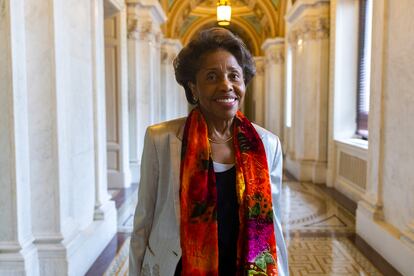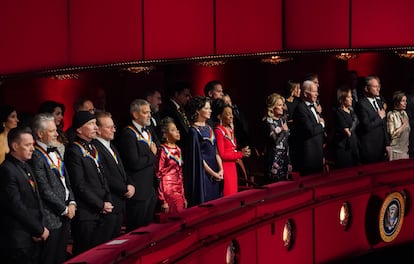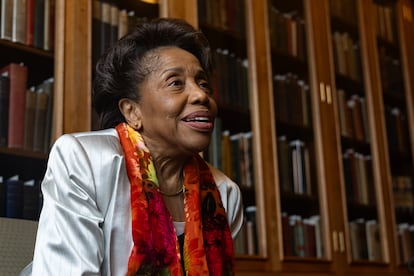Tania León, composer: ‘I’ve lived in another galaxy. My grandparents made me believe nothing was impossible’
The celebrated Cuban artist based in New York reviews her career, from her childhood in the same neighborhood as Compay Segundo and Chucho Valdés to her musical achievements, recognized with a Pulitzer Prize and a Grammy


At 82, Tania León exudes vitality. Many memories demonstrate that she has lived an intense life, first in her native Cuba and then in her host country, the United States, where she arrived at the age of 24 thanks to the lottery. She was one of the approximately 300,000 Cubans who left as refugees on the so-called Freedom Flights, a program that operated between 1965 and 1973. She had no intention of emigrating, only of studying in Paris. Nor did she grow up thinking she would be a composer, or an orchestra conductor, or a teacher, or that she could compose an opera. But she did it all. León maintains that everything in life fell to her by chance, as if her talent hadn’t been responsible for her success.
She has a long list of awards to her name. In 2021, she won the Pulitzer Prize for Music for Stride, her orchestral work inspired by the activism of Susan B. Anthony and premiered by the New York Philharmonic. In 2022, she received an honorary distinction from the Kennedy Center in Washington, D.C., and this year she won an honorary Grammy, among other accolades. In this interview, conducted at the Library of Congress in Washington, León looks back to her early years in Cuba — when her grandparents bought her a piano at the age of five and her neighbors included Compay Segundo and Chucho Valdés — and her long career, which has led her to establish herself as one of today’s most talented musicians. With a broad smile and a warm gaze, somewhere between tender and mischievous, she affirms that she still has everything left to do.
Question. You spent your childhood and part of your youth in Cuba. What are your fondest memories from that time?
Answer. The culture in general... Because I grew up dancing. Both inside the house and at the dances that were held in my time. One of them was called La Tropical or something like that. You’d go dancing with your boyfriend and it was a real ceremony. Everyone was very dressed up, the men wore guayaberas... I remember it very well, it makes me very nostalgic.
Q. When you were five, you were given a piano. Did your family already see musical aspirations in you?
A. Every time I think about it, it seems extraordinary, because for my family, which was very humble, it was a huge effort. My grandmother cajoled my grandfather and said, “We have to do something. You need a piano.” And he bought it. Used, of course. They loved the possibility of me doing something different. I was the first to go to college. They tried to give my brother and me the best.
Q. When did you think music could be your career?
A. I never thought about it. I liked it and won competitions and everything. When I was older, I started thinking about it because there was a pianist I really liked, Martha Argerich. She was a role model for the time, one I wanted to follow.
Q. You came to the United States when you were 24. What dream did you bring with you?
A. The dream of going to Paris. I didn’t want to come here. I came here because it was the only chance I had to get out, with the lottery. I won the right to a seat and to land in Miami.
Q. And you didn’t go to Paris, but to New York...
A. Yes, because it was the center of music. When I arrived in Miami, it was a country town. The Miami we know today didn’t exist.
Q. What was the most painful thing about emigrating?
A. Everything, because I didn’t think about emigrating. I was going to study in France and see how my life unfolded. But I’m a planetary person; I love the world and different languages and cultures. This is just a tiny little ball in the middle of the universe. That’s why I love traveling so much, and I’ll visit a palace as much as a slum. I feel comfortable in both.
Q. How was the transition from pianist to composer?
A. It seems like I was on my path. The first person who said I was going to be a composer was my harmony teacher. I did some harmonic exercises that he thought weren’t exercises, but pieces. In Cuba, my brother and I invented songs, got together with several of the musicians, and made small arrangements. We were always inventing something, but I never thought I would be a composer.

Q. How did you get started at the Dance Theater of Harlem?
A. It was a coincidence. I wasn’t planning on playing in a ballet. I went to Harlem for the first time in my life as a substitute for a classmate at NYU (New York University), where I was learning English and getting my degree validated. I was very excited because I had only seen Harlem in movies. That same day, Arthur Mitchell (founder of the Dance Theater of Harlem) decided to go to the same place. He was looking for a venue to start his classes, because at that time, Harlem dance didn’t exist. He asked me to be the pianist. I didn’t know who he was until I went to the ballet theater and saw his picture in the program. That’s how I found out who I was working with.
Q. Your first composition was Tones, and you dedicated it to your grandmother. You later dedicated a work to your mother. The women in your family seem to have had a great influence on you.
A. My grandmother took care of my brother and me. My mom was 18 when I was born, and my dad was 21. They were just kids, so my grandparents took charge. My grandmother was the one who took me to a conservatory when I was four because she thought I had something with music. It was somewhat avant-garde. My teachers were also almost all women.
Q. Did being a woman or being Cuban present any barriers in your career?
A. I’ve never had that mindset of what I stand for. I’ve lived in another galaxy. I never saw that as something that prevented me from doing what I wanted. And I also had the support of my grandparents, who made me believe that nothing was impossible.
Q. How did your roots influence your composition for ballet?
A. Since I come from a dance-centric culture, starting to work with Arthur wasn’t a problem. I started without speaking; it was all about movement. Mine is a culture where everyone dances, and I used to go see Alicia Alonso’s ballet in Cuba. My grandmother took me to symphony concerts. We knew the musicians who lived in my neighborhood in Havana. Compay Segundo lived on the corner near my house.
Q. A luxury neighbor…
A. That’s right. Another person who saw me grow up was Chucho Valdés, who always identified me as a pianist.
Q. What has your work as a professor at the university and with the Composers Now foundation meant to you?
A. I learned to be a teacher by giving classes because I never thought I’d do it; it wasn’t my thing, but they invited me. I really like students. They always have new ideas that are out of the ordinary. I love anything new, even if it’s just a dream. And the organization I founded to promote living composers, who don’t have to be just classical music composers, is one of the things that has given me the greatest satisfaction.
Q. You have accumulated artistic and honorary achievements, with a long list of awards, including the Pulitzer Prize.
A. It’s all been a surprise. These are things that just keep coming my way. Like the Pulitzer Prize. I didn’t know I was on that list. I found out through a friend, who called me at home. I was at the dentist, and when I came back, I found he’d sent me an email saying “congratulations.” I called him to ask him why he was congratulating me, and I couldn’t believe it. I told him he was crazy. And he told me to look at the website, that my picture was there.
Q. How does it feel when you get a surprise like that?
A. I go back to that time when I started studying and my grandmother brought me flowers for my recital. All of that goes through my mind at that moment because it’s a fairy tale. I didn’t know I was going to live in New York and speak English; I thought I’d speak French and live in France and look at the Eiffel Tower every day.

Q. What do you still have to do professionally?
A. Everything (laughs). I don’t know because my life is full of surprises. Like when I met the composer Hans van de Hansen. He sent a fax to my house, and I thought it was someone playing a joke on me, so I said, “No jokes, please.” Then he sent me another fax and invited me to his festival. On the way out, he told me to write an opera. I told him I didn’t like opera, but I ended up writing one.
Sign up for our weekly newsletter to get more English-language news coverage from EL PAÍS USA Edition
Tu suscripción se está usando en otro dispositivo
¿Quieres añadir otro usuario a tu suscripción?
Si continúas leyendo en este dispositivo, no se podrá leer en el otro.
FlechaTu suscripción se está usando en otro dispositivo y solo puedes acceder a EL PAÍS desde un dispositivo a la vez.
Si quieres compartir tu cuenta, cambia tu suscripción a la modalidad Premium, así podrás añadir otro usuario. Cada uno accederá con su propia cuenta de email, lo que os permitirá personalizar vuestra experiencia en EL PAÍS.
¿Tienes una suscripción de empresa? Accede aquí para contratar más cuentas.
En el caso de no saber quién está usando tu cuenta, te recomendamos cambiar tu contraseña aquí.
Si decides continuar compartiendo tu cuenta, este mensaje se mostrará en tu dispositivo y en el de la otra persona que está usando tu cuenta de forma indefinida, afectando a tu experiencia de lectura. Puedes consultar aquí los términos y condiciones de la suscripción digital.








































